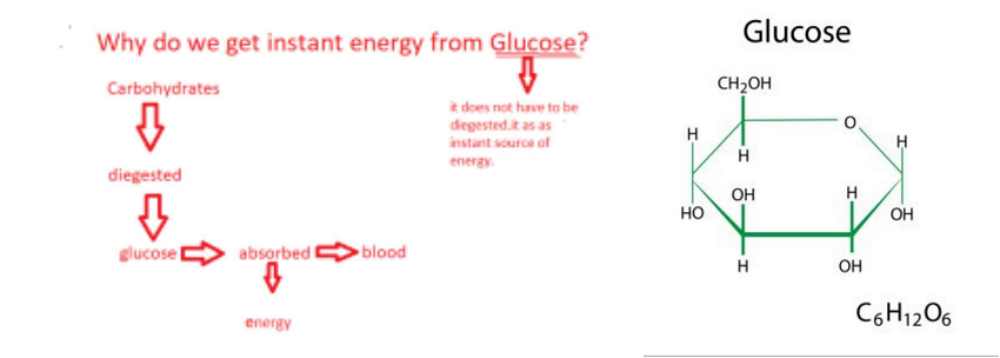Why do we get instant energy from Glucose
- Posted on
- Home /
- Why do we get instant energy from Glucose
Why is Glucose called a source of instant energy?
Glucose is a simple sugar that can be easily absorbed by the body. Glucose, unlike other meals such as carbs, does not require processing by the digestive system in order to be utilized as a source of energy.
It enters the bloodstream and the cells simultaneously after being absorbed straight into the body. Upon entering the cell, glucose is immediately oxidized, which leads to the production of ATP, a high-energy molecule that serves as the cell’s primary source of fuel.
Instant energy food
Glucose/ Formula: C₆H₁₂O₆
Blood sugar was a different name that some people used to refer to glucose. Because it is a monosaccharide, which is the simplest form of carbohydrates, it has a significant amount of sugar.
In addition to glucose and fructose, monosaccharides include galactose and ribosome. Monosaccharides are a straightforward type of carbohydrate.

Food that gives instant energy
Glucose can be obtained through the food that you eat as well as from the glucose powder that is sold in stores.
Some examples of foods that include glucose are white bread, spaghetti, potatoes, honey, as well as fruits, vegetables, and dairy products.
The body can use sugar in 3 ways:
1. Glucose :
Glucose is the primary source of fuel for a large number of cells throughout the body. When a carbohydrate is digested, it is first turned into glucose, and then glucose travels through the blood to all of the tissues in the brain.
All carbohydrates, with the exception of fibre, are broken down into glucose.
2. Glycogen:
The form of carbohydrates that are stored within the body.
It is composed of several glucose units, all of which are linked to one another.
The body is capable of converting glucose into glycogen, which can then be temporarily stored for future use in the event that the energy requirements of the liver and skeletal muscles increase.
If you go an extended period of time without eating, or if your body requires additional energy while you are working out, it will pull glycogen from its stores.
The body will experience exhaustion once its glycogen stores have been drained.
3. Fat:
Once the glycogen stores in the body have reached their full capacity, the excess glycogen may be stored as fat.
When an individual consumes more carbohydrates than their bodies are capable of storing as glycogen, the extra carbohydrates are turned into fat in the body.
Carbs, however, do not independently cause a rise in body weight; nonetheless, an excess of carbohydrates, like an excess of any other macronutrient, can be stored as fat in the body.
Carbohydrates are found in many different foods, including bread, pasta, rice, potatoes, corn, beans, fruits, vegetables, and dairy products. They’re also used by our bodies for fuel during exercise and other physical activity.
The Brain Needs Fuel To Work.
Our brains need glucose (a type of sugar) to function properly. This is because glucose provides the brain with its main source of energy.
It’s also needed to produce hormones and neurotransmitters that help regulate mood, sleep, appetite, and more.
Carbohydrates Are A Source Of Energy For The Body.
Carbs provide our bodies with an immediate source of energy. They’re found in foods such as bread, pasta, rice, potatoes, corn, beans, fruit, and vegetables. These carbs are broken down into glucose, which then enters the bloodstream.
Once there, the body uses the glucose to fuel cells throughout the body.
When You Eat Carbs, They're Converted Into Blood Sugar And Then Used By The Body.
When we eat carbs, they’re converted into blood sugar (glucose) by the pancreas. This blood sugar then travels through the bloodstream to the liver where it’s stored as glycogen.
Glycogen is used by the muscles when they need extra energy. It also helps regulate the levels of insulin in the body. Insulin is a hormone that regulates how much glucose is taken up by the cells.
f too little insulin is present, more glucose will enter the bloodstream.
Eating Too Much Fat Can Cause Insulin Resistance.
When we eat fat, it enters our bodies as triglycerides. Triglycerides are made up of three fatty acids attached to a glycerol molecule. Once inside the cell, these fats are broken down into free fatty acids and glycerol.
Free fatty acids are released into the bloodstream and carried to the liver where they are stored as triglycerides. These triglycerides are then transported back to the muscle cells where they are used as fuel.
Insulin Is Required To Transport Excess Fat Into Cells.
However, when glucose levels rise, insulin is secreted by the pancreas. This hormone binds with receptors on the surface of the cell membrane and transports glucose into the cell.
As glucose enters the cell, it triggers an enzyme called phosphorylase to break down glycogen into glucose. Glycogen is a storage form of glucose found in the muscles and liver.
Once glucose has been converted into glycogen, it is stored in the liver and muscles until needed.
